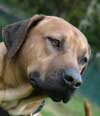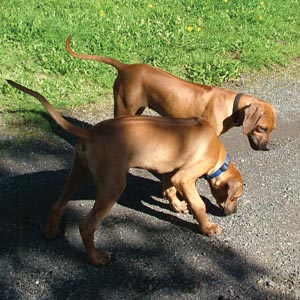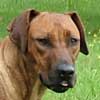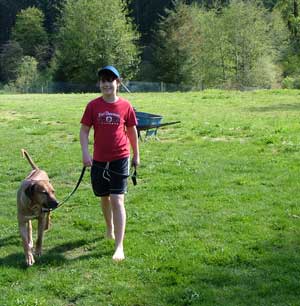Is the Ridgeback the right Dog for my family?
Here are some things to consider before making your decision to add a Rhodesian Ridgeback to your family. Many times people will see a Rhodesian Ridgeback and fall in love with it’s regal looks, never considering that one of these gorgeous Ridgebacks may be totally unsuitable for their lifestyle. You may not have the proper facilities or you may not realize how much exercise and companionship a Rhodesian Ridgeback requires. You may need to develop your ability to train and control a large breed dog before embarking upon such a tail wagging adventure.
Buying anything on impulse is not a good idea, and buying a dog on impulse can be a total tragedy. You must do your doggie homework and educate yourself about this "life-of-the-dog" commitment first, before your final decision is made to acquire one of these magnificent animals, making certain that you have carefully considered all that the Ridgeback has to offer you and what demands a Rhodesian Ridgeback will have on your time, your space, your resources, and your energy.
Ridgebacks are not to be considered a Golden Retriever or a Labrador with a short coat of hair. These dogs are hunting dogs and they require a lot of positive training. Most of them are not going to dote over your every glance and word. If not properly trained, some of them can be oblivious to being called, hard-headed, and disobedient. Ridgebacks are definitely not the dog for everyone.
Ridgebacks are not a trophy to decorate your home or yard with. They are living, feeling creatures who need be treated as a loving and loyal member of your pack family. You should think of them as a new addition to your family and plan for them as you would plan for a new child. Any dog ownership requires your responsibility and companionship.

Are Ridgebacks Noisy Dogs? Chewers? Barkers?
Normally Ridgebacks are not yapping dogs at all. They tend to bark only when there is something worthwhile to bark at, so if they bark, you'll want to go check it out. Although we could most likely find cases where a lonely and neglected dog of any breed, including a Ridgeback who has been ostracized to the back yard 24/7 and has fallen into a bad habit of barking out of sheer boredom, loneliness, and a lack of training and companionship.
It is very natural for dogs and children to put things into their mouths. It feels good to them. Dogs are just doing what comes natural when they eat, drink and even play with their mouths. Our job is to help them learn the proper way to entertain themselves and understand what is acceptable and not acceptable to place their mouths on and/or chew on.
When going through those puppy teething periods, as youngsters to about 4-1/2 months and sometimes again when they are about 8 to 10 months old, most Ridgebacks can be quite destructive in their chewing if not provided with things that you want them to chew on, such as safe and fun toys, Multipet Nuts for Knots-Rope Ball, various hard plastic Kongs, raw knuckles from the butcher, sterilized beef bones, those really hard Nylabones or Gumabones for the smaller mouths, the Nylabone Double Action Dental Chew is fun for puppies and the jagged part of it helps to clean a little tarter off the teeth, flossies, and other favorite puppy chews.
Just as you would place a human baby into a playpen, crate training your puppy can be an essential part of your training program and can have many uses, including keeping an unsupervised, adolescent Ridgeback contained with their own personal chews while you are unable to babysit them temporarily.
How much exercise does a Rhodesian Ridgeback need?
Ridgebacks easily adapt to the lifestyle of their family, love to do whatever things you do and look forward daily to participating in all of your activities. Like any large breed of dog, Ridgebacks need daily exercise just like humans do, so a few long trips to the park per week and some daily action in the back yard or park should be sufficient for a Ridgeback to stay healthy, although the more physical activities you include your dog in, like daily walks/runs/jogs, the better for both of you. It has been said that "If you are overweight, you are not exercising your Ridgeback enough."
Humans and Ridgebacks both need exercise for emotional, mental and physical vitality. When you have two active dogs, they will stimulate each others brains and burn lots of energy playing, running and messing around with each other, in addition to having activities with you.

How long do Ridgebacks live?
11 to 14 years is a good average life span for a Rhodesian Ridgeback, although many Ridgebacks live up to 16 years. A vigilant Ridgeback owner makes sure their Rhodesian Ridgeback gets plenty of daily exercise, sleeps on a good comfortable bed, watches out for unusual lumps or behaviors in their dog, makes sure their Ridgeback is eating a healthy diet and is not overweight, always has fresh water for their sweetheart, participates in good dental hygiene practices with their dog, and uses common sense in assessing their Ridgeback daily, just like any parent would watch after their beloved child. These things all attribute to a long, happy, and healthy life for your Rhodesian Ridgeback. Your dog will depend on you for love, protection, and care for a long time, so being a dog owner is a great responsibility and requires a very serious "Life-of-the-Dog" commitment from you and your family.

Do Ridgebacks get along with cats?
Friendship is generally up to your cat. Ridgebacks like cats, when they are raised with them. They usually love all animals who live in the family pack with them and many cats also enjoy a Ridgebacks company once they realize the Ridgeback is a part of the family. Many older Ridgebacks who have never been exposed to a cat, might think a quick chase of the feline is a fun activity.

How big do Ridgebacks get?
Ridgeback puppies do not stay little very long, so you'll want to take some pictures so you'll remember what they looked like when they were little. Most Rhodesian Ridgebacks reach their adult height of 24 - 27 inches at the withers/shoulders and almost their adult weight (65 to 80 pounds for females and 90 to 100+ pounds for males) by the time they are 14 months old! After that they will simply start to beef out and become more solid or filled out.
Participating with your puppy in lots of activities, fun walks, hiking up and down hills, and scheduling proper exercise will further along the development of your puppy's muscles, build their chests, and be oodles of fun for the both of you.
.jpg)
Below is a short list of questions you must be able to answer yes to, if you are serious about getting a Rhodesian Ridgeback puppy.





